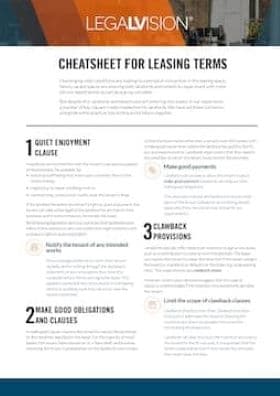If you are a landlord, you must be aware of your legal obligations. Otherwise, you run the risk of breaching the commercial lease agreement. A fundamental covenant in a lease is the landlord’s obligation to provide quiet enjoyment of the premises to the tenant. The purpose of this covenant is to provide the lessee with an uninterrupted enjoyment of the leased premises. A ‘quiet enjoyment’ clause within a lease agreement will often be broad and conditional on the tenant’s compliance with the provisions of the lease. Nevertheless, this article explains how the covenant to provide quiet enjoyment can affect your obligations as a commercial landlord.
What is Quiet Enjoyment?
A tenant’s right to quiet enjoyment generally means that they are entitled to occupy the commercial premises without interruption from the landlord. Depending on your lease agreement, the right to quiet enjoyment can prevent landlords from:
- erecting scaffoldings that hinder entry and exit points on the premises;
- stopping lifts and escalators from operating that enable customer access; or
- failing to repair a leak in a roof that prevents the tenant’s business from operating.
If a landlord’s conduct or inaction causes disruptions to the tenant’s business, then the landlord may be in breach of the tenant’s right to quiet enjoyment. As a result, the tenant has the right to claim damages and, depending on the seriousness of the breach, could terminate the lease.
Are There Limits to the Right to Quiet Enjoyment?
The rights and obligations in leases will vary and may qualify this right to quiet enjoyment. For example, a common provision that can be found in a lease agreement is the landlord’s right to place a “to let” or “for sale” sign in the final three months of your lease term.
Another common provision is the landlord’s right to enter the premises to carry out structural repairs and conduct inspections. Usually, the right to enter requires the landlord to provide notice to the tenant. This applies except in the case of an emergency where, for example, the electrical wiring requires urgent maintenance.
Additionally, a lease agreement can limit the right to quiet enjoyment. For example, a common clause within a commercial lease is a ‘relocation’ clause. A relocation clause ensures the landlord can require the tenant to relocate during the term of the lease for renovations or repairs. The ‘relocation’ clauses will not always provide for any losses the tenant may incur due to the cost of the fitout or loss of business.
Continue reading this article below the formDoes the Right to Quiet Enjoyment Have to Be in the Lease Agreement?
While many leases contain a ‘quiet enjoyment’ clause, the covenant is generally implied in your lease agreement. This means that the law generally assumes that the tenant enjoys a right to quiet enjoyment of the property, even if the commercial lease arrangement does not contain a clause to that effect.
For this reason, you must specify the scope of the right in your lease agreement. Doing so can help minimise disputes, given both landlord and tenant are certain about their corresponding rights and obligations under the lease agreement.
Does Termination Breach the Right to Quiet Enjoyment?
The law does not consider terminating a lease as a breach of the quiet enjoyment covenant in every circumstance. The question of whether lease termination breaches this covenant will depend upon the particular circumstances and the clauses within the lease.
Usually, a landlord can give notice to terminate the lease for the redevelopment of the premises. However, there must be evidence of the landlord’s genuine need to do so. For example, the landlord might terminate the lease because of a:
- breach of contract;
- non-disclosure; or
- refurbishment or demolition.
Further, the termination must be on the terms and conditions of the lease. If you are not sure whether your lease termination has breached the tenant’s right, you should consult an expert leasing lawyer to review your documentation.

This cheat sheet explains the key clauses you need to be aware of as a landlord in a lease agreement.
Key Takeaways
Signing a lease is often a significant financial and business commitment. However, issues with your quiet enjoyment can have a significant impact on your use of the premises. A tenant’s right to quiet enjoyment generally means that they are entitled to occupy the commercial premises without interruption from the landlord. Nevertheless, the lease agreement will vary and may qualify this right. Therefore, you must draft a robust lease agreement to ensure both landlord and tenant understand their rights and corresponding obligations.
If you are having issues with the occupation of your leased premises or would like to ensure your right is sufficiently covered within your lease, our specialist leasing laws can assist you as part of our LegalVision membership. For a low monthly fee, you will have unlimited access to lawyers to answer your questions and draft and review your documents. Call us today on 1300 544 755 or visit our membership page.
We appreciate your feedback – your submission has been successfully received.










